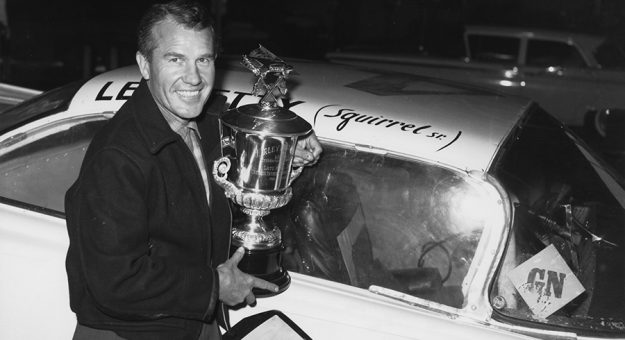During the summer of 1949, future NASCAR champion Lee Petty was desperately searching for a way to provide for his family as they lived in a three-room home with no plumbing and no electricity in Level Cross, N.C.
But the situation soon began to improve thanks to Bill France, who had founded NASCAR in an effort to bring professionalism and organization to stock car racing.
France called for anyone with an entry fee and a car to compete in a June 19 race at Charlotte (N.C.) Speedway.
Little did Petty know that his decision to answer France’s call would set the foundation for what would become one of the most successful dynasty in NASCAR’s seven-decade history.
Born March 14, 1914, Petty was the sixth of nine children born to Judson Ellsworth Petty and Jesse Maude Bell Petty. As he reached his adult years, Lee Petty met Elizabeth Toomes in the early 1930s. married in 1937 and had sons Richard Lee in 1937 and Maurice Ellsworth in 1939.
Lee Petty, a part-time farmer and all-around hustler for a dollar, didn’t begin racing in NASCAR until he was 35. Of all the options on the table, Petty believed stock car racing offered the most hope for building his financial future.
Petty grew up tough during very hard times in the early 1900s. It was all about providing for his family because he was a family man. One year the Pettys grew a plentiful crop of tomatoes. The next year they turned their attention to running a small trucking company that hauled all types of goods, including illegal liquor.
“Yes, he was tough, but he was fair,” said Petty’s grandson Kyle, who was an eight-time NASCAR Cup Series race winner. “You have to always tether the word fair to him. He was the poster child for someone that grew up in the Depression in rural America, in rural North Carolina.
“Growing up in the Depression was really hard to do. You did anything you could do to make it,” Kyle Petty continued. “If you were a sawmiller, you cut lumber. If you had a truck, you hauled freight for somebody if you lived close to a big town. That’s what you did. If you could work on a car, that’s what you did. According to daddy (Richard Petty), my granddaddy did a little bit of everything and never really settled on anything, other than driving a truck and racing.”
Lee Petty’s first real foray into stock car racing was the initial NASCAR Cup Series race at the three-quarter-mile Charlotte (N.C.) Speedway dirt track. That venture didn’t end well, as Richard Petty explained during a long ago press conference at Daytona Int’l Speedway.
“Somehow or another, he talked one of his buddies (Gilmer Goode) into letting him run his car in the Charlotte race,” Richard Petty said. “So we left the service station there in Greensboro and it was my dad, mother, brother and myself and headed out for Charlotte. We went to a Texaco there in Charlotte, put the car on a lift, took the muffler off, changed the oil and put the No. 38 on the side of the car. Halfway through the race, he flipped it and tore the doors off. The car was torn all to pieces and they had to go back the next day and put it on a flatbed truck. We had to hitch a ride back home with our uncle. How he explained it to the guy he borrowed the car from, I don’t know. That was almost the end of Petty Enterprises right there.”
Petty entered five more races in 1949 with cars he owned himself and finished all of them, including his first victory. He won $3,375 for the season. That was a fortune considering what he had made in trucking, and tomatoes and other previous ventures. From then on, Lee Petty was a professional driver in NASCAR’s premier division. He chose No. 42 from the last two numbers from his North Carolina license plate. Ironically, doing so led to Petty Enterprises using the numbers 40, 41, 42, 43, 44, 45 and 46 through the years.
Click below to continue reading.
